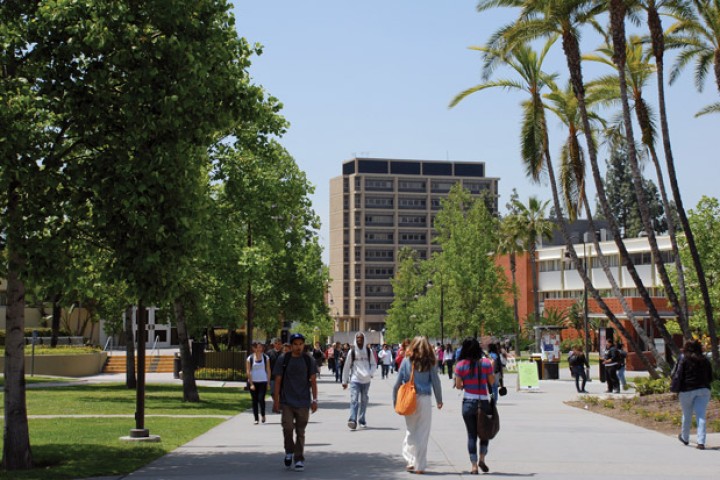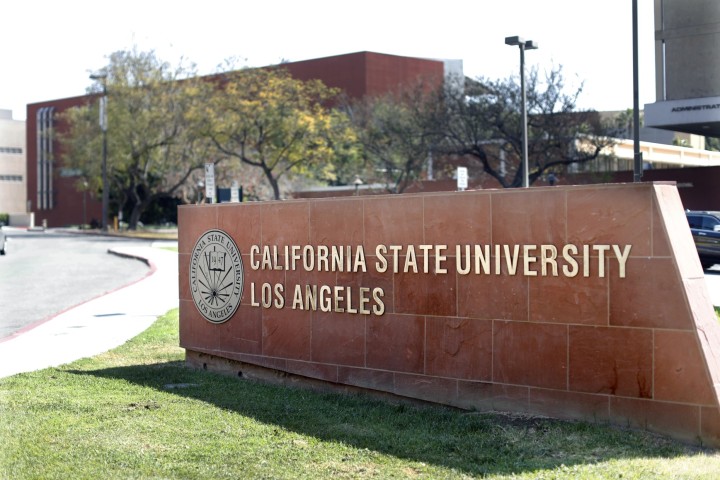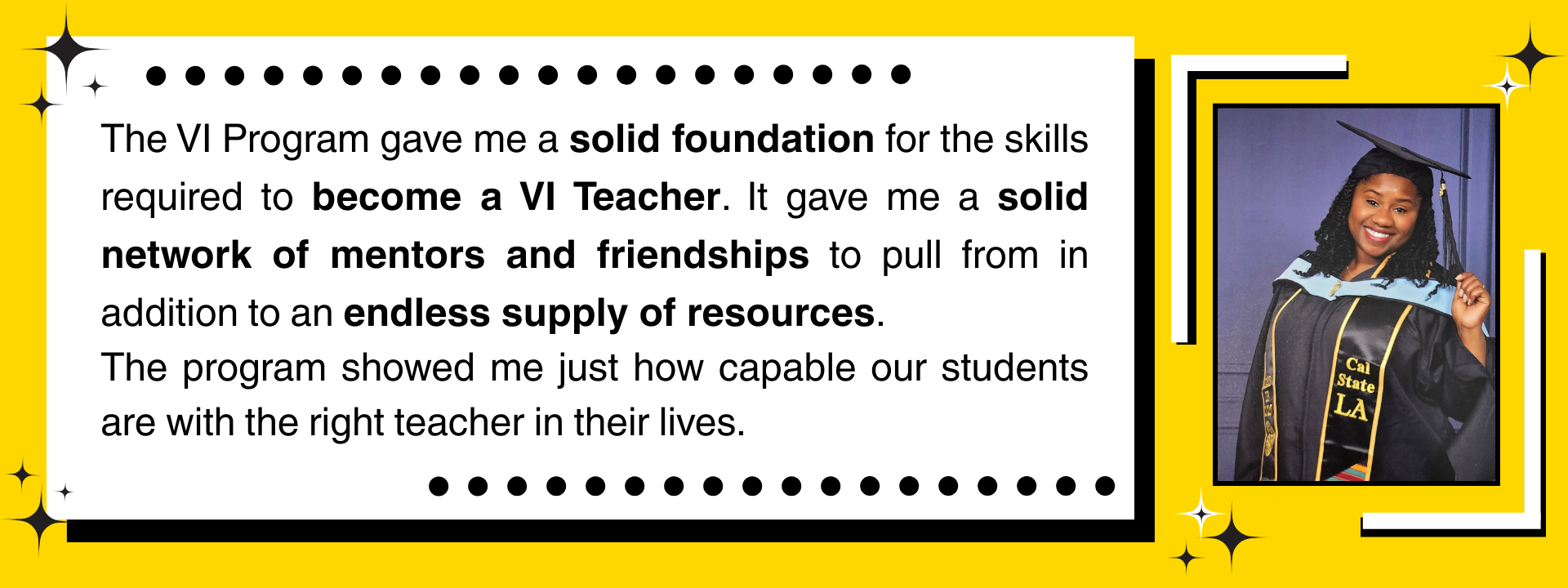California State University, Los Angeles offers an Educational Specialist Credential in Visual Impairment (VI) and a Master of Arts (M.A.) degree in Special Education with an emphasis in Visual Impairment. Courses in both the VI credential and M.A. program promotes educational equity, collaboration, reflective practice, while maintaining mastery of the body of knowledge for the specific discipline of interest.
Graduates of the VI credential and M.A. program may work as itinerant, resource room, and special classroom teachers, or as teachers at specialized schools for students with visual impairments and blindness. They also may serve as consultants and support professionals to public school teachers in elementary, middle, or high schools.
The purpose of the credential program is to prepare teachers to work with infants, toddlers, children and youth who are blind and visually impaired, including those with multiple disabilities, to teach in a diverse urban society. Credential candidates learn to teach academic and functional skills, including reading and writing braille. Students learn instructional strategies and methods for adapting materials for learners who are visually impaired. They also develop skills to assess functional vision and determine learning media. Emphasis is placed on preparing candidates to provide instruction in independent living skills, low vision efficiency, use of assistive technology, leisure/recreation skills, vocational/transition, and social skills.
The purpose of the MA degree is to provide students with higher education learning. One major focus of the MA program is on analyzing and conducting educational research in the field of visual impairment and blindness. Students in the MA program must complete one of two options as their culminating experience: 1) pass the MA comprehensive examination in Visual Impairment and Blindness or 2) complete a thesis project. Before applying to the M.A. program, you must first apply for the Educational Specialist Credential in Visual Impairments program, and once admitted, you must schedule an appointment with Dr. Cheryl Kamei-Hannan, the VI program advisor, at 323-343-6297 or [email protected].

Applications are now open!
We encourage prospective students to apply to our programs. For the most current application dates and deadlines, please visit the Cal State LA Admissions website.
Information Sessions
For more information on the programs offered or to make an appointment with Dr. Cheryl Kamei-Hannan, the VI program coordinator, please call 323-343-4400 or email [email protected].
Alumni Spotlight
Jaye Service
What were some of your most favorite parts about the program?
One or my favorite experiences about the program were the braille classes, both the Literary and the Nemeth classes. It always felt like I was learning a code that no one else knew. Another highlight of the program was gaining experience as a new teacher during Early Fieldwork while enjoying working alongside my students. This experience really showed me just how much VI students need incidental learning and just how fun a lot of these experiences can be.
Why should students choose to attend the Cal State LA VI program?
Upcoming students should choose to attend Cal State LA’s VI program because they honor working students and have class schedules that are flexible and align with your life. This program pushes you to your full potential and guides you toward success as a Teacher of Students with Visual Impairments. They also prepare and connect you to programs and districts for employment, internships, and experiences and give you a sense of confidence as you enter into the world of teaching.

Scholarships and Grants
- AER Scholarship
- AFB Scholarship
- CTEBVI: Katie Sibert Scholarship
- Dale M. Schoettler Scholarship
- EduMed: Visual Disability Scholarship
- Golden State Teacher Grant
- NEA Grant
- NFB Scholarship
- Teach California
- TEACH Grant
- OSEP Grant : If CSULA VI receives funding and funding is available contact Dr. Cheryl Kamei-Hannan to find out if current funding is available.
FAQ
Credential candidates learn to teach academic and functional skills, including reading and writing braille. Students learn instructional strategies and methods for adapting materials for learners who are visually impaired. They also develop skills to assess functional vision and determine learning media. Emphasis is placed on preparing candidates to provide instruction in independent living skills, low vision efficiency, use of assistive technology, leisure/ recreation skills, vocational/transition, and social skills. Program graduates may work as itinerant teachers, resource room teachers, and special classroom teachers, or as teachers at specialized schools for visually impaired children and youth. They may also serve as consultants and support professionals to public school teachers in elementary, middle, or high schools.
Generally speaking, to earn an Education Specialist Credential in Visual Impairments students must commit to two years of full-time study to earn a Preliminary Education Specialist Credential in Visual Impairments, followed by an additional set of course work to complete a Clear Education Specialist Credential in Visual Impairments. However, some students may have taken courses at CSULA or from another institution while pursuing other teaching credentials. Some of these courses may be transferred and advisement should be sought for a determination of transferable credit.
Students entering the Education Specialist Credential in Visual Impairments must meet subject matter requirements. This may be done by passing both exams, the CBEST and CSET, prior to entering the program. However, students who have met the subject matter requirement in an alternate way (e.g., possession of a single subject credential) may not need to pass the CSET, please visit the following link for additional information and/or contact your advisor for further clarification of subject matter requirements. Options to Meet the Basic Skills Requirement - Additional Resources (ca.gov)
International students may apply to CSULA and work towards earning a MA in Special Education with an emphasis in Visual Impairments.
Yes. In fact, many credential candidates are working full time as teachers of students with visual impairments. Generally, courses are offered in the evenings, and some are offered on weekends. Also, many courses are offered using distance modalities including webinar and technology driven methods.
Please meet with your program advisor to create a program plan. The program plan will assist you in course planning. It is recommended to meet with your advisor each semester to help you to stay on track and ultimately lead to timely completion of the program.
If you already have a valid, clear California teaching credential there may be some courses that you would not be required to take. You will need to meet with the VI advisor to determine which courses would not be required.
Students with an O&M credential are required to meet the subject matter requirement or pass the California Subject Exam for Teachers (CSET). While there may be some courses previously taken to earn an O&M credential, additional courses will need to be taken. Meet with your advisor to determine which additional courses are required.
All students enrolled in the Education Specialist Credential in Visual Impairments are required to complete 2 fieldwork practicums. The California Commission on Teacher Credentialing requires a total of 600-750 hours of fieldwork practicum.
Cal State L.A. offers an Educational Specialist Credential in Visual Impairment and a M.A. degree in Special Education. Students interested in applying to the MA program in Special Education with a specialization in Visual Impairments should apply to the program prior to taking 9 units of MA coursework. Please check with your advisor for advisement about the MA program.
Students enrolled in the VI Program may obtain an Education Specialist Credential in Visual Impairments independent of an MA degree, or students may choose to concurrently earn a Master of Arts degree (MA) in Special Education with a specialization in Visual Impairments.
Students who are working towards their MA degree in Special Education with an emphasis in VI must also earn or possess an Education Specialist Credential in VI. Exceptions are sometimes made for international students.
Yes, you can take EDSP 4000 and EDSP 4010 through Open University/Extended Education while waiting on formal acceptance to the university.
You may take some specialized courses before you are formally admitted. However, it is recommended that you meet the subject matter requirements prior to beginning specialization coursework. Also, because some courses are offered once a year, and pre-requisite requirements vary, it is recommended that you frequently meet with your advisor to determine which courses you are eligible to take.
Courses in the VI program vary in the manner in which they are offered. Many courses are offered fully online using a variety of virtual online tools. Some courses are hybrid courses, meaning they meet partially online and face-to-face, and other courses, such as the lab courses meet face-to-face. Additionally, many courses meet on Saturdays. For more information about course modality, please contact your program advisor.
CSULA offers a BA degree in Urban Learning. As part of the Urban Learning program, you may take some courses that will count towards earning your Education Specialist Credential in VI. For more information on possible courses you will need to meet with the Urban Learning advisor, Jesus Arellano at [email protected].
The Education Specialist Credential Program in VI is a program for graduate students. However, students who are enrolled in the Urban Learning program at CSULA may take courses in Special Education while they complete their BA.
An abundant number of job opportunities are available in the VI field. Although visual impairments are considered a low incidence disability, at a national level, highly qualified teachers of students with visual impairments are scarce. Job listings are commonly posted on Edjoin. Please visit their website at: https://www.edjoin.org/Account/Login
For information regarding the Education Specialist Intern Credential Program, please visit the Intern Program Website Education Specialist Intern Program | Cal State LA to book an appointment with an advisor.
Resources
- American Council for the Blind (ACB)
- American Foundation for the BlindAFB
- American Printing House for the Blind
- Association for Education and Rehabilitation for the Blind and Visually Impaired (AER)
- Best Colleges for Students with Visual Impairments
- CAST
- The CHARGE Syndrome Foundation
- Council for Exceptional Children (CEC)
- Disability Rights Advocates
- Disability Rights Education & Defense Fund
- Financial Resources and Discounts for Students With Disabilities
- Hobbies and Activities for Special Needs
- Legal Guide for Newly Disabled Seniors
- National Braille Press
- National Center on Deaf-Blindness (NCDB)
- National Federation of the Blind
- National Organization for Albinism and Hypopigmentation (NOAH)
- Optic Nerve Hypoplasia Awareness
- Perkins School for the Blind
- Resources for Traveling with Disabilities
- Should They Stay or Should They Go: Selling a Home with Modifications
- Teaching the Art of Cooking to People with Disabilities
- Texas School for the Blind and Visually Impaired (TSBVI)
- Transcribing Mariners
- Vista Center for the Blind and Visually Impaired
- Volunteers of Vacaville
- Beyond Blindness
- Blind Children's Center
- Blind Children’s Learning Center (Orange County)
- Braille Institute of America
- Braille-N-Teach
- California Association for Parents of Children with Visual Impairments (CAPVI)
- California Commission on Teacher Credentialing (CTC)
- California Council for the Blind (CCB)
- California Deaf Blind Services San Francisco (CDBS)
- California School for the Blind (CSB)
- Child Development Services (Formerly Blind Babies Foundation Program)
- Clearinghouse for Specialized Media and Technology (CSMT)
- Marshall B. Ketchum University
- Partners for Pediatric Vision
- San Francisco Lighthouse for the Blind and Visually Impaired
- Wayfinder Family Services
- Access Ingenuity
- Camp Bloomfield
- Enchanted Hills Camp
- Davidson Learning Center
- Department of Rehabilitation (DOR)
- Guide Dogs for the Blind Outreach Services
- Guide Dogs of America
- Hadley School for the Blind
- The Hatlen Center for the Blind
- Paths to Technology
- Regional Centers for the Developmentally Disabled
- Society for the Blind
- The Seeing Eye Inc.
- Orange County Department of Education Adult Transition Program (OCDE)
- WonderBaby.org
- Family Connect
- American Action Fund For Blind Children and Adults
- American Printing House for the Blind (APH)
- Attainment Company Pathways to Literacy
- BANA
- Bookshare
- Braille 2000
- Braille Brain
- Braille Institute of America
- Braille Too
- California Braille and Talking Book Library
- California Dyslexia Guidelines
- Dolphin Easy Reader & Voice Dream Reader
- Learning Ally
- Literary Braille Online Course (UEB)
- Lutheran Braille Workers
- National Braille Press (NBP)
- National Instructional Materials Accessibility Center (NIMAC)
- NIMAC project launched at the American Printing House for the Blind
- National Library Service for the Blind and Physically Handicapped (NLS)
- ObjectiveEd
- OHFATech
- Read Naturally
- Rocket Reader
- Seedlings Braille Books for Children
- Sources of Free Braille Books
- SPEL Technologies, Inc.
- Storybookonline
- Storyline Online
- Tools to Support Having a Student with a Visual Impairment in your Classroom
- Overview of English Language Learners – Paths to Literacy
- English Language Learning – Paths to Literacy
- Instructional Strategies for English Language Learners – Paths to Literacy
- elpacinfoguide23.docx (live.com)
- APH Hive
- Arizona Deafblind Project | Teaching Tips Tuesday
- Association for Education and Rehabilitation for the Blind and Visually Impaired (AER)
- California School for the Blind (CSB)
- California Transcribers and Educators for the Blind and Visually Impaired (CTEBVI)
- CSUN Assistive Technology Conference
- DCMP
- Exceptional Teaching, Inc.
- Introduction to Blindfold Games: Video - Perkins School for the Blind
- Iris Center
- Journal of Visual Impairment and Blindness (JVIB)
- National Research Agenda for Science
- Nemeth in a Box
- Objective Ed
- Paths to Literacy
- Perkins School for the Blind
- Project Inspire
- Region 4 Visual Impairment
- Sonja Biggs Educational Services, Inc.
- Teaching Students with Visual Impairments
- Texas School for the Blind
- A&E Low Vision
- Access Ingenuity
- Alternate Text Production Center
- American Thermoform Corporation
- APH
- Bapin Group, LLC
- Baum USA
- Berryessa Designs
- Blind In Mind The Braille Superstore
- Braille Blaster
- DAISY Consortium
- Duxbury Systems, Inc.
- E.A.S.Y. Tactile Graphics
- Enabling Technologies
- Enhanced Vision
- Eschenbach Optik
- Exceptional Teaching Aids
- Eye.t
- Freedom Scientific
- HARPO Mountbatten Brailler
- HIMS, Inc.
- HumanWare
- Irie-AT Inc.
- LS&S
- NorthState Assistive Technology
- NVDA Screen Reader
- Optelec
- Perkins School for the Blind Solutions
- Sterling Adaptives
- Sweetman Systems
- Talking Typer
- Talking Typer Apple Store
- Tech-VI Announce List
- Top Tech Tidbits Blind & Visually Impaired Technology Listserv Directory
- Touch Graphics, Inc.
- Typer Online
- Typing.com
- Typio
- ViewPlus Technologies, Inc.
- YesAccessible!
- Ballyland Magic App
- Blindfold Games
- Blindfold Air Hockey
- Blindfold Bowling
- Blindfold Pool
Contact Informaion
For more information on the programs offered or to make an appointment with Dr. Cheryl Kamei-Hannan, the VI program coordinator, please call 323-343-4400 or email [email protected].
Staff
Dr. Cheryl Kamei-Hannan, Professor and Program Coordinator
Seanarae Smith, PIPP Grant Coordinator
Gina Mitchell, Adjunct Faculty
Ramona McLaughlin, Adjunct Faculty
Jeanine Interiano, Adjunct Faculty
